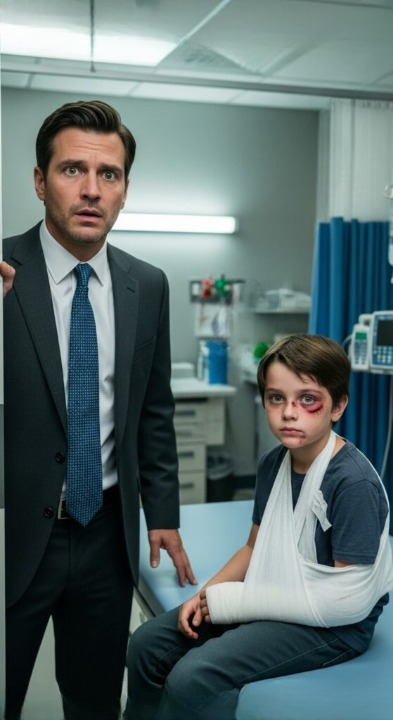The call came on a Thursday afternoon, cutting through my workday like a knife. I was sketching final revisions on a downtown development plan, pencil tracing crisp lines on white paper, when my phone buzzed.
“Mr. Trevino,” a woman’s voice said urgently, “this is Colorado General Hospital. Your son is in the ER. You need to come immediately.”
I froze. “There’s a mistake. I don’t have a son.”
“Sir, he’s asking for you by name—Tyler Trevino. Please hurry.”
The line went dead.
Twenty minutes later, I stood in the emergency room, the antiseptic air thick and sterile. A nurse led me through the corridors and opened a door. On the bed lay a boy, maybe seven, his right arm in a cast, his face scraped and raw. But what struck me most were his eyes—hazel-green, identical to mine.
He looked up and whispered, “You came.”
I blinked. “Who… who are you?”
“My name’s Theo Bright. My dad’s name is Royce. You’re Tyler Trevino, right? The architect?”
The name hit me like a sledgehammer. Royce Bright—my former business partner. A friend I hadn’t seen in years.
“Yes,” I said cautiously. “Why did you tell them to call me, Theo? Where’s your father?”
Theo swallowed hard. “I… I had to tell you. About my dad. About your wife.”
The room seemed to tilt.
He told me everything in trembling whispers—how he’d overheard my wife, Selena, meeting Royce when he claimed to be working late. A year of betrayal hidden in plain sight.
The doctor arrived, asking for Royce’s contact. I gave it, watching the panic unfold over the phone. Royce arrived frantic, grateful, unaware that his son had just exposed his entire secret. I shook his hand, expression unreadable. “Glad he’s okay,” I said, though my mind was already building something else.
That night, I didn’t confront Selena. I watched her laughter, her perfect domestic smile. No flicker of guilt. Too good. I lay awake, drafting blueprints not for buildings, but for revenge.
The next morning, I contacted Harvey Ali, my college friend and top family law attorney. He set me up with Nanette Casey, a private investigator sharp as broken glass. Within a week, we had the truth: Selena and Royce had been meeting at a boutique hotel twice a week for eighteen months. A secret phone, siphoned joint funds, plans to divorce me after my next project launched.
I wanted more than divorce. I wanted precision. Justice.
“Can I buy Royce’s debt?” I asked Harvey.
“You want to own his debt?” he raised a brow.
“Yes. Every cent.”
Within weeks, through shell companies, I purchased every lien, loan, and outstanding balance Royce owed—nearly four hundred thousand dollars. I baited the trap: a fake partnership in a luxury downtown project, a two-hundred-thousand-dollar “good-faith” deposit. Royce, blinded by greed, fell for it.
When he wired the money, I revealed everything. “Congratulations, Royce. You just wired two hundred thousand into an account I control—for a project that doesn’t exist. And I own your debts. Every cent.”
He paled. “This is illegal!”
“No,” I said, coldly. “This is justice.”
Angelo Kerry, a federal investigator, stepped in. Royce had been laundering money—federal offenses. He slumped in his chair, begging. I didn’t answer.
Later that night, Selena came home, radiant. “You look happy,” she said.
“I had a productive day,” I replied, smiling faintly.
Within hours, federal agents raided Royce’s office. His company collapsed. Joint accounts froze. Selena realized too late that I knew everything.
By the end of the month, divorce finalized. She got nothing.
And I completed my downtown project. The building rose tall against the Denver skyline—not just a testament to architecture, but to planning, precision, and foundations that could withstand even betrayal.
Because in architecture, as in life, the foundation matters most—and mine had been stronger than any lie.
